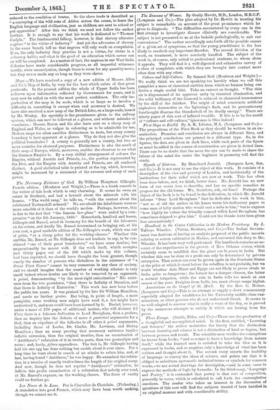Three Essays. (Smith, Elder, and Co.)—These are the production of
a thoughtful and accomplished mind. In the first, entitled, "Learning and Science," the author maintains the theory that the distinction between learning and science is not a distinction of kind or degree, but between process and result. The scientific man verifies the conceptitins ho learns from books, "and so comes to have a knowledge from nature itself," while the learned man is satisfied to take the idea as it is expressed in books, and so acquires only a knowledge of what has been written and thought about it. The second essay asserts the inability of language to convey the ideas of science, and points out that it is obliged to substitute systematic technical terms or symbols for common words,—to use actual drawings for description,—and in some cases to express the methods of logic by formulae. In the third essay, "Language and Poetry," it is contended that poetry is that sort of composition, generally in verse, which is calculated to call forth the contemplative emotions. The reader who takes an interest in the discussion of questions of this sort will find the subjects treated of here handled in an original manner and with considerable ability.






























 Previous page
Previous page